Highlighting transformative biblical tales, this exploration delves into the essence of revival, inviting a journey of spiritual awakening and renewal.

Examples of Revival in the Bible
Isn't it fascinating how the Bible, a book as ancient as time itself, speaks volumes about revival and transformation?
You've probably heard of King David's heartfelt repentance, Jonah's reluctant mission to Nineveh, or the Pentecost that marked a new beginning. These narratives aren't mere stories; they're profound examples of change and renewal that have echoed through centuries.
But what makes these instances stand out, and how do they relate to the concept of revival in today's context?
Let's embark on a journey through these biblical accounts, uncovering the depths of spiritual awakening they offer, poised on the edge of historical and contemporary relevance.
Key Takeaways
- Revival often follows sincere repentance, as seen in Nineveh's transformation and King David's personal redemption.
- Leadership plays a crucial role in spiritual revival, exemplified by King Josiah's reforms and Nehemiah's rebuilding efforts.
- Divine intervention and empowerment, such as the Pentecost and Paul's conversion, catalyze spiritual renewal and evangelistic outreach.
- Collective commitment to change, illustrated by the early Christian community and Jonah's mission to Nineveh, is essential for revival.
The Repentance of King David

King David's repentance emerges as a pivotal moment in the biblical narrative, demonstrating the profound impact of personal accountability and divine forgiveness. This episode, deeply intertwined with David's guilt and Bathsheba's story, illustrates the grave consequences of his actions and his subsequent journey towards redemption.
You'll find that David's guilt wasn't merely a personal feeling of remorse but a catalyst for divine intervention, shaping his legacy and Israel's history.
Analyzing Bathsheba's story within this context, you encounter a narrative rich in complexity and ethical dilemmas. David's actions—his adultery with Bathsheba, followed by the arranged death of her husband Uriah—expose a king failing to live up to his divine appointment. However, it's his confrontation with the prophet Nathan that marks the beginning of his repentance. This moment highlights the significance of accountability, as David doesn't shy away from admitting his sins, underscoring the biblical theme of repentance.
David's sincere repentance and plea for forgiveness in Psalms, particularly Psalm 51, showcase a man acknowledging his failings before God. This narrative is fundamental in understanding the dynamics of sin, repentance, and forgiveness, emphasizing that genuine contrition can lead to divine mercy and restoration.
Jonah's Mission to Nineveh

In the biblical narrative, Jonah's mission to Nineveh represents a profound exploration of divine mercy and human repentance, challenging both the prophet and the city to confront their shortcomings and the possibility of redemption. This story unfolds significant themes about Nineveh's repentance and God's compassion, demonstrating a dynamic interplay between divine will and human agency.
Consider these aspects:
- Nineveh's Immediate Response: Unlike many, Nineveh's inhabitants, from royalty to commoners, heeded Jonah's warning immediately. This universal acceptance of a prophetic voice underscores a collective willingness to change, rare in historical and biblical contexts.
- Jonah's Reluctance: Jonah's initial resistance to God's command highlights human apprehension towards divine directives, especially when they involve the perceived enemy. His eventual compliance serves as a testament to the irresistible nature of divine will and the transformative power of obedience.
- God's Compassion: The narrative emphasizes God's willingness to forgive on a grand scale when faced with genuine repentance. This divine attribute of mercy stands as a central theme, illustrating that no nation is beyond the reach of God's compassion.
- The Significance of Repentance: Nineveh's repentance acts as a catalyst for its survival, suggesting that sincere remorse and a commitment to change can avert disaster. This principle resonates throughout biblical teachings, offering hope and guidance for generations.
King Josiah's Religious Reforms
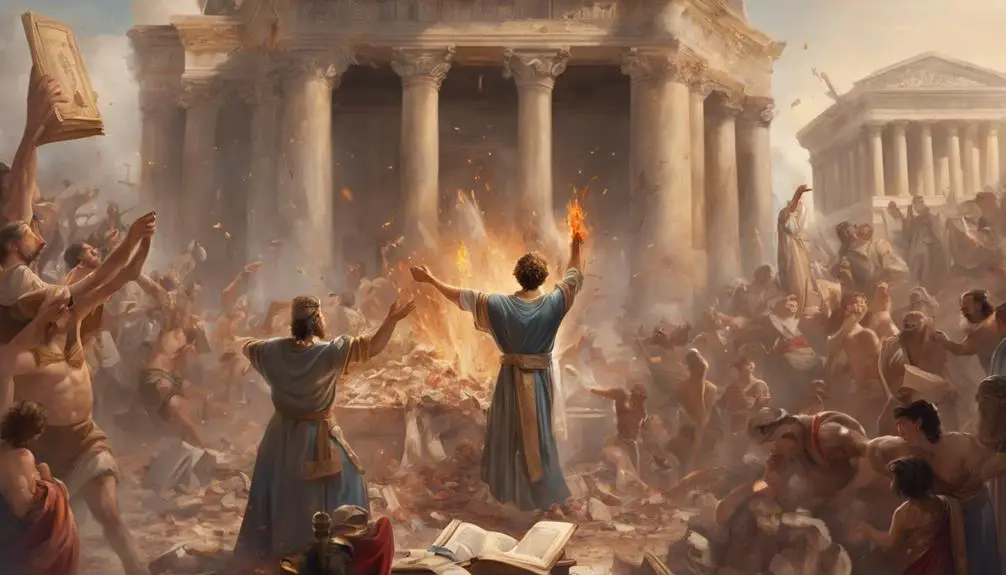
A pivotal moment in biblical history, Josiah's religious reforms dramatically reshaped the spiritual landscape of Judah, steering the nation back towards monotheism and covenantal fidelity. You'll find that the catalyst for these sweeping changes was Josiah's discoveries during the renovation of the Temple in Jerusalem. Among the debris and decay, the High Priest Hilkiah unearthed a book of the Law, likely Deuteronomy, long forgotten and neglected. This discovery wasn't merely archaeological; it was a spiritual wake-up call.
Josiah's response was immediate and decisive. Recognizing the nation's deviation from its foundational truths, he initiated a series of reforms aimed at purging Judah of idolatry and restoring the worship of Yahweh alone. He tore down altars to foreign gods, dismissed priests who served these deities, and even extended his campaign into the remnants of the northern kingdom of Israel, emphasizing the unification of religious practice under one God.
Most importantly, Josiah's actions culminated in a public covenant renewal ceremony. He gathered the people of Judah, from the least to the greatest, and read aloud the rediscovered book of the Law. Together, they pledged to follow Yahweh and keep His commandments, thereby recommitting the nation to its covenantal relationship with God. Josiah's reforms, thus, weren't merely about religious purification but were a profound act of national restoration and spiritual revival.
Nehemiah Rebuilds Jerusalem's Walls
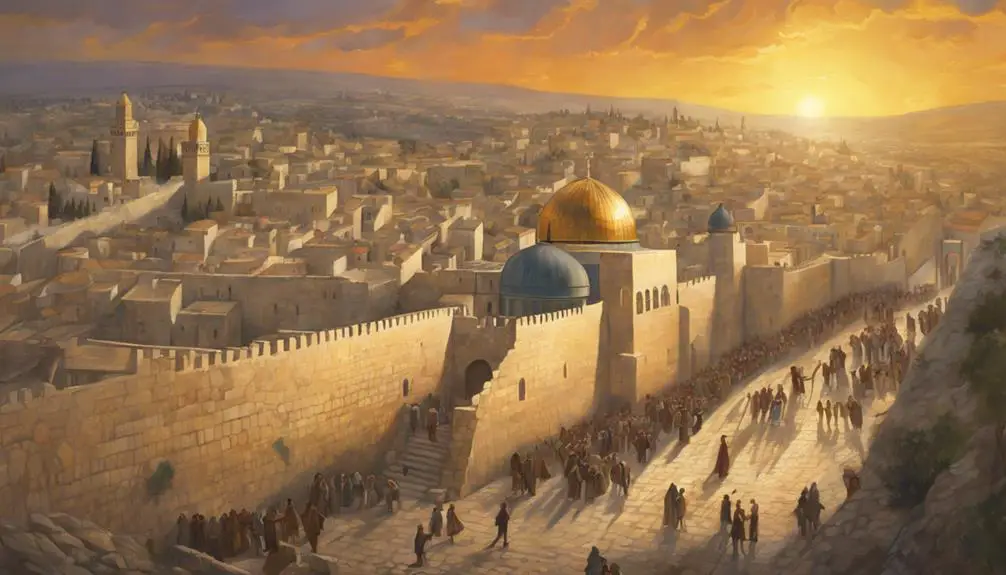
Following the spiritual revival initiated by Josiah, Nehemiah's efforts to rebuild Jerusalem's walls marked a critical phase in restoring not only the city's physical security but also its communal and religious integrity. You'll see how Nehemiah's leadership and the community's response exemplify a profound transformation.
- Community Involvement: Nehemiah's project was a testament to the power of collective action. He didn't rebuild the walls alone; instead, he mobilized the entire community. Each family took responsibility for a portion of the wall, symbolizing unity and shared purpose.
- Leadership Challenges: Nehemiah faced significant opposition from external enemies and internal dissent. His leadership was tested through ridicule, threats, and even plots against his life. Despite these challenges, his commitment to the task and his strategic approach to both leadership and defense were unwavering.
- Strategic Planning: Nehemiah demonstrated the importance of careful planning and organization. He assessed the damage, organized the people by families, and strategically positioned guards to protect the workers.
- Spiritual Reformation: The rebuilding of the walls wasn't just a physical reconstruction but also a catalyst for spiritual renewal. It reminded the community of their identity and covenant with God, reinforcing the religious revival that Josiah started.
Nehemiah's story teaches you about the importance of leadership, community involvement, and the intertwined nature of physical and spiritual restoration.
The Pentecost: A New Beginning
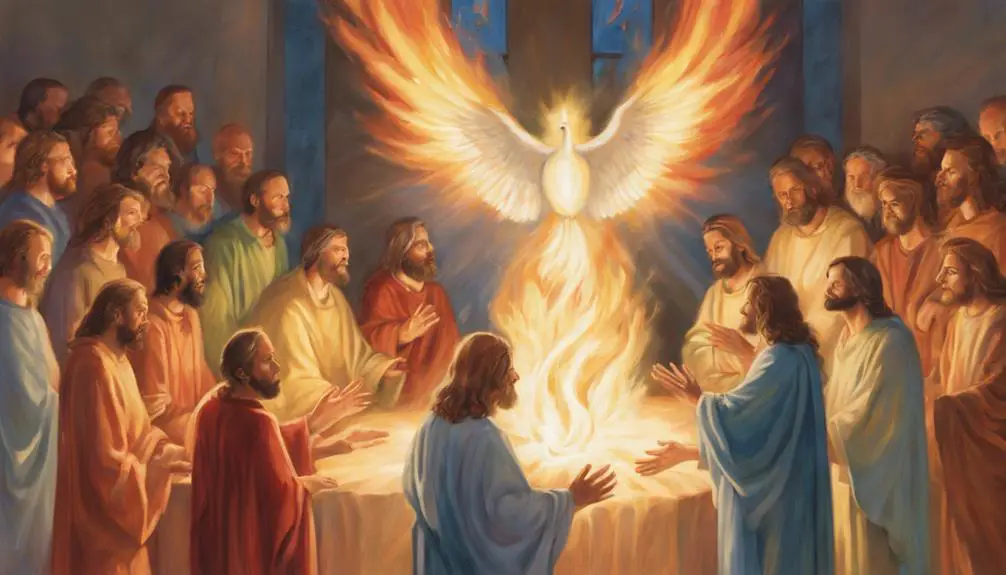
As we turn our attention to The Pentecost, it marks a pivotal moment of transformation and renewal in the early Christian community, initiating a new era of spiritual empowerment and widespread evangelism.
The descent of the Holy Spirit upon the Apostles and other followers of Jesus Christ, as described in the Acts of the Apostles, signified the birth of the Apostolic Church. This event not only empowered the Apostles to speak in tongues, symbolizing the universal nature of the Church's mission, but also marked the fulfillment of Christ's promise to send a "Helper" or "Advocate" to guide His followers.
The Pentecost underscores the dynamic interaction between divine agency and human response. The Holy Spirit did not merely descend upon passive recipients; rather, it galvanized the Apostles to step out in faith, breaking cultural and linguistic barriers to preach the Gospel.
Emotion |
Response |
|---|---|
Awe |
The community witnessed the Apostles speaking in tongues, a direct manifestation of the Holy Spirit's power. |
Unity |
The event brought diverse peoples together, unified under the message of Christ. |
Courage |
Empowered by the Holy Spirit, the Apostles fearlessly proclaimed the Gospel, setting a precedent for future generations. |
This turning point in biblical history illustrates the transformative power of the Holy Spirit in establishing the Apostolic Church as a beacon of hope and salvation.
Frequently Asked Questions
How Does the Concept of Revival in the Bible Relate to Modern Christian Practices and Church Growth Strategies?
You'll find that modern Christian practices and church growth strategies deeply intertwine with the concept of revival, emphasizing digital evangelism and community outreach. These approaches mirror historical revivals by adapting to contemporary methods to spread faith and rejuvenate communities.
Digital platforms offer new avenues for evangelism, while community outreach remains a timeless strategy, ensuring the church's growth and influence extend both online and in physical communities, reflecting a modern manifestation of revival principles.
Are There Instances of Revival in the Bible That Led to Significant Societal or Political Changes Outside of Israel and Early Christian Communities?
You're diving into how revivals can catalyze cultural shifts and political upheavals beyond Israel and early Christian circles. It's intriguing to analyze instances where religious awakenings have significantly transformed societies.
While the Bible itself may not explicitly document these effects in distant lands, the ripple effects of biblical revivals often indirectly influenced wider cultural and political landscapes. Understanding these dynamics requires a deep look into historical contexts and the broader impacts of spiritual renewals.
What Role Do Prophetic Visions and Dreams Play in Biblical Revivals, and How Are These Elements Interpreted in Contemporary Religious Contexts?
In biblical revivals, prophetic visions and dreams are pivotal, offering divine guidance. You'll find that dream interpretation and visionary symbolism are deeply analyzed in contemporary religious contexts, as they were believed to signal God's will.
Today, scholars and believers alike delve into these elements, seeking understanding and parallels in modern faith practices. This exploration bridges ancient narratives with current spiritual insights, highlighting their enduring relevance and impact on religious thought and revival.
Can the Principle of Revival Be Applied to Personal Spiritual Renewal, and if So, How Does One Pursue Such an Experience According to Biblical Teachings?
Certainly, the principle of revival can be applied to personal spiritual renewal. To pursue such an experience, you'll need to focus on personal discipline and seek community support.
These elements are crucial for fostering a deeper spiritual growth. By embracing disciplines such as prayer, study, and fasting, and by engaging with a supportive community, you can navigate the path of personal revival as guided by biblical teachings.
How Do Biblical Accounts of Revival Address the Relationship Between Divine Intervention and Human Agency in the Process of Spiritual Renewal?
You're exploring how divine intervention and human effort intertwine in spiritual renewal.
Biblical narratives demonstrate this dance between Divine Will and Human Responsibility vividly. They show that while God initiates revival, your response matters deeply.
It's not just about divine action; it's also about your willingness to align with that grace. This balance underscores a cooperative dynamic where both divine and human elements are essential for genuine spiritual transformation.
Conclusion
In analyzing these biblical narratives, it's evident that revival often emerges from a profound acknowledgment of wrongdoing, coupled with a fervent commitment to transformation.
King David's repentance, Jonah's successful mission to Nineveh, King Josiah's sweeping reforms, Nehemiah's dedication to rebuilding, and the transformative event of Pentecost each underscore a pivotal theme: genuine revival is rooted in a collective awakening to moral and spiritual imperatives.
These episodes not only reflect individual and communal rejuvenation but also underscore the enduring power of faith and repentance in fostering profound societal change.

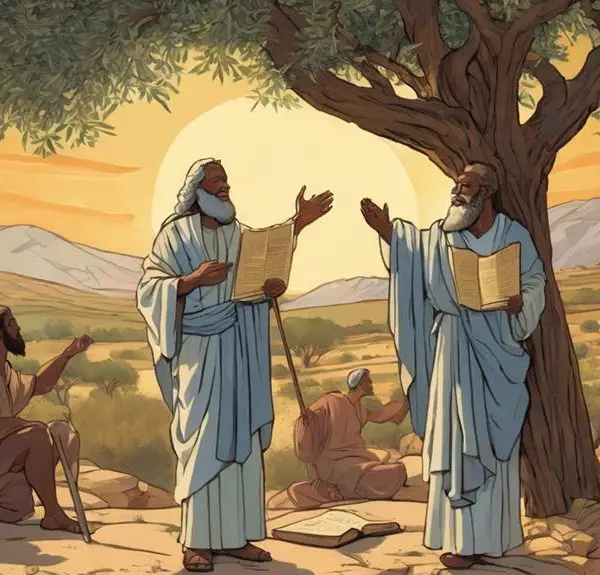
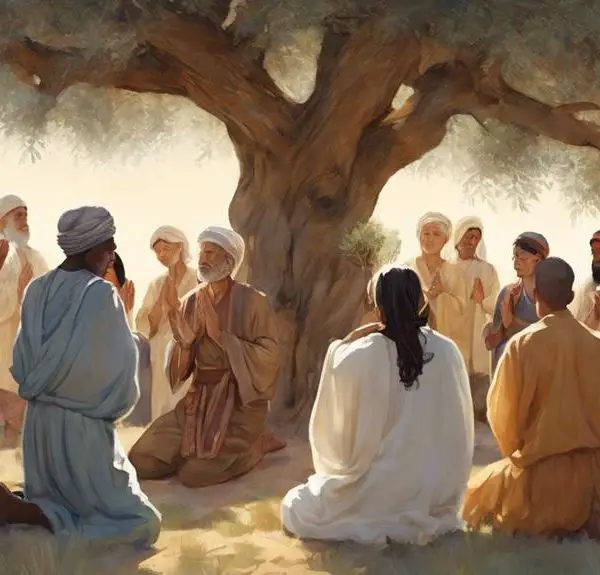
Sign up